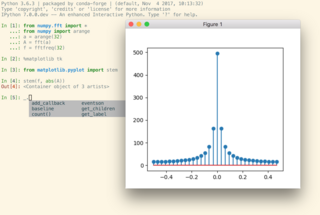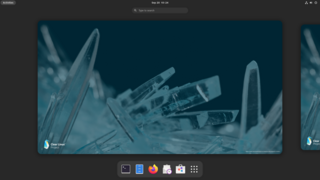reStructuredText is a file format for textual data used primarily in the Python programming language community for technical documentation.
seccomp is a computer security facility in the Linux kernel. seccomp allows a process to make a one-way transition into a "secure" state where it cannot make any system calls except exit , sigreturn , read and write to already-open file descriptors. Should it attempt any other system calls, the kernel will either just log the event or terminate the process with SIGKILL or SIGSYS. In this sense, it does not virtualize the system's resources but isolates the process from them entirely.
Matthew David Welsh is a computer scientist and software engineer and is currently the co-founder of Fixie.ai, which he started after stints at Google, xnor.ai, and Apple. He was the Gordon McKay Professor of Computer Science at Harvard University and author of several books about the Linux operating system, several Linux HOWTOs, the LinuxDoc format and articles in the Linux Journal.
Squashfs is a compressed read-only file system for Linux. Squashfs compresses files, inodes and directories, and supports block sizes from 4 KiB up to 1 MiB for greater compression. Several compression algorithms are supported. Squashfs is also the name of free software, licensed under the GPL, for accessing Squashfs filesystems.

The Linux Foundation (LF) is a non-profit organization established in 2000 to support Linux development and open-source software projects.

IPython is a command shell for interactive computing in multiple programming languages, originally developed for the Python programming language, that offers introspection, rich media, shell syntax, tab completion, and history. IPython provides the following features:
Benevolent dictator for life (BDFL) is a title given to a small number of open-source software development leaders, typically project founders who retain the final say in disputes or arguments within the community. The phrase originated in 1995 with reference to Guido van Rossum, creator of the Python programming language.
Spacewalk is open-source systems management software for system provisioning, patching and configuration licensed under the GNU GPLv2.
Sphinx is a documentation generator written and used by the Python community. It is written in Python, and also used in other environments.

The OpenDaylight Project is a collaborative open-source project hosted by the Linux Foundation. The project serves as a platform for software-defined networking (SDN) for customizing, automating and monitoring computer networks of any size and scale.
Long-term support (LTS) is a product lifecycle management policy in which a stable release of computer software is maintained for a longer period of time than the standard edition. The term is typically reserved for open-source software, where it describes a software edition that is supported for months or years longer than the software's standard edition.

Anaconda is a distribution of the Python and R programming languages for scientific computing, that aims to simplify package management and deployment. The distribution includes data-science packages suitable for Windows, Linux, and macOS. It is developed and maintained by Anaconda, Inc., which was founded by Peter Wang and Travis Oliphant in 2012. As an Anaconda, Inc. product, it is also known as Anaconda Distribution or Anaconda Individual Edition, while other products from the company are Anaconda Team Edition and Anaconda Enterprise Edition, neither of which is free.

Snap is a software packaging and deployment system developed by Canonical for operating systems that use the Linux kernel and the systemd init system. The packages, called snaps, and the tool for using them, snapd, work across a range of Linux distributions and allow upstream software developers to distribute their applications directly to users. Snaps are self-contained applications running in a sandbox with mediated access to the host system. Snap was originally released for cloud applications but was later ported to also work for Internet of Things devices and desktop applications.

Nextcloud is a suite of client-server software for creating and using file hosting services. Nextcloud provides functionality similar to Dropbox, Office 365 or Google Drive when used with integrated office suites Collabora Online or OnlyOffice. It can be hosted in the cloud or on-premises. It is scalable, from home office software based on the low cost Raspberry Pi, all the way through to full sized data centers that support millions of users. Translations in 60 languages exist for web interface and client applications.

A notebook interface or computational notebook is a virtual notebook environment used for literate programming, a method of writing computer programs. Some notebooks are WYSIWYG environments including executable calculations embedded in formatted documents; others separate calculations and text into separate sections. Notebooks share some goals and features with spreadsheets and word processors but go beyond their limited data models.
Bcachefs is a copy-on-write (COW) file system for Linux-based operating systems. Its primary developer, Kent Overstreet, first announced it in 2015, and it was added to the Linux kernel beginning with 6.7. It is intended to compete with the modern features of ZFS or Btrfs, and the speed and performance of ext4 or XFS.

Clear Linux OS is a Linux distribution, developed and maintained on Intel's 01.org open-source platform, and optimized for Intel's microprocessors with an emphasis on performance and security. Its optimizations are also effective on AMD systems. Clear Linux OS follows a rolling release model. Clear Linux OS is not intended to be a general-purpose Linux distribution; it is designed to be used by IT professionals for DevOps, AI application development, cloud computing, and containers.

MkDocs is static site generator designed for building project documentation. It is written in Python, and also used in other environments.









